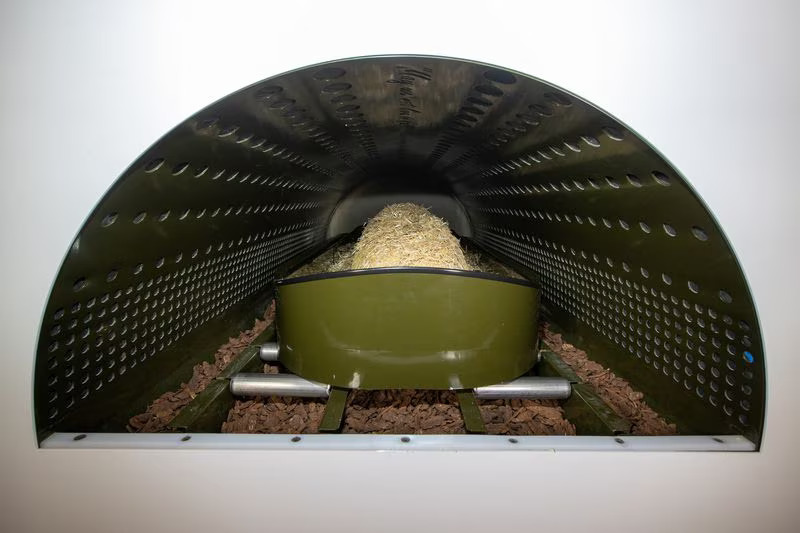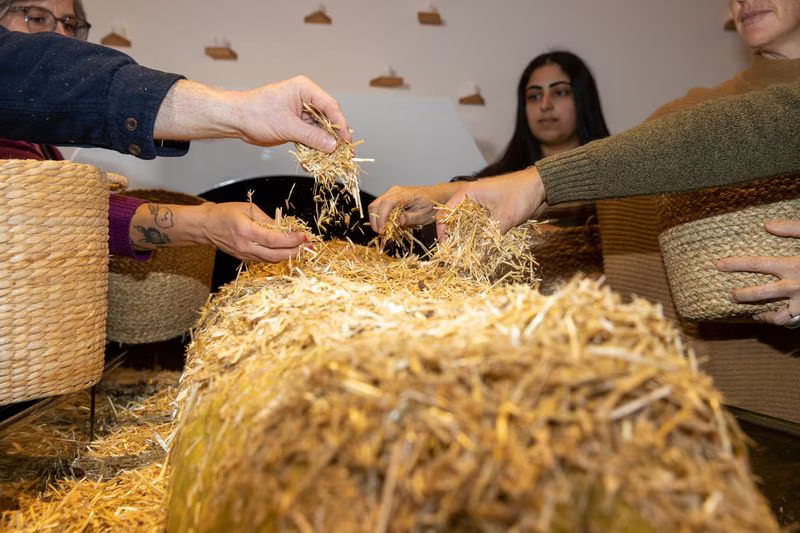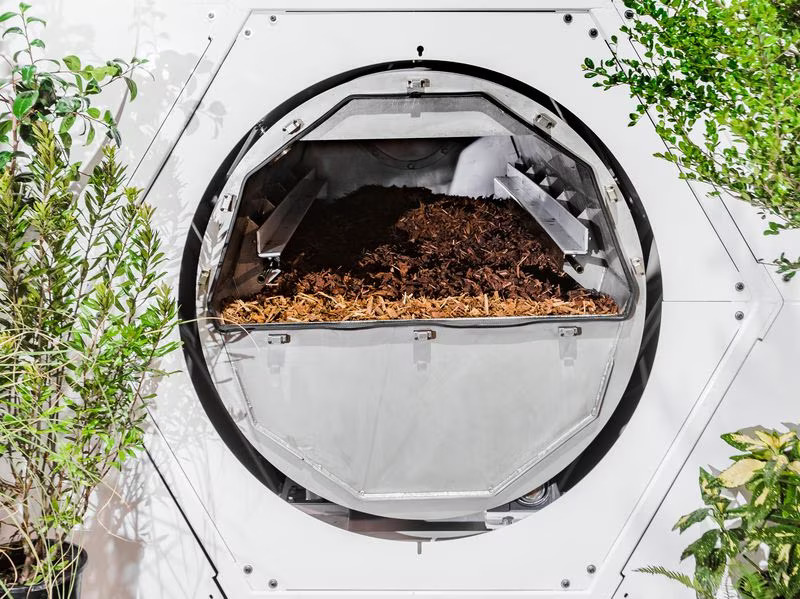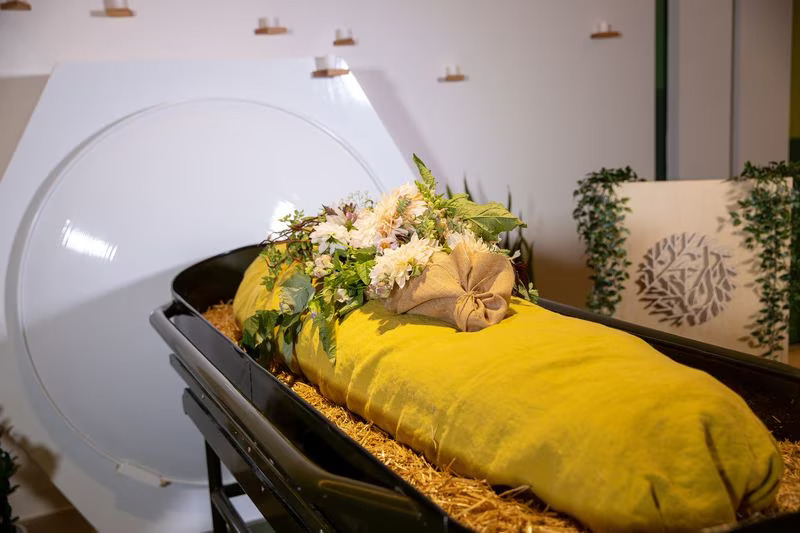

A shrouded mannequin covered in wood chips and straw rests inside a vessel at Recompose Seattle, a green funeral home specializing in human composting. The practice could be coming to New Jersey. (Photo by Mat Hayward/Getty Images for Recompose)Getty Images for Recompose
By Jackie Roman | NJ Advance Media for NJ.com
This story was produced in collaboration with CivicStory as part of the New Jersey Sustainability Reporting project.
Imagine a funeral where your loved one is placed on a bed of wood chips and straw inside a steel cylinder vessel.
Following a ceremony, the remains are locked in the steel vessel, heated over a period of five to seven weeks, and emerge as soil that can be spread in a forest or your yard.
It’s not a science-fiction scenario. It’s human composting — a new funeral method that advocates say is better for the environment.
The practice could be coming to New Jersey under legislation introduced by state Sen. Joe Vitale (D-Middlesex) in February. The proposed law (S3610) would update cemetery and crematorium regulations to “incorporate the creation and regulation of natural organic reduction facilities and the oversight of the organic reduction process.”
Vitale, who also sponsored legislation that brought physician assisted suicide to the state, did not respond to requests to comment on the bill. A similar bill (A5258) was introduced in the state Assembly, though neither has received a hearing yet.
If approved, New Jersey would join seven other states — California, Colorado, Nevada, New York, Oregon, Vermont and Washington — that have legalized human composting since 2019.
Some funeral directors and religious organizations, including the Catholic Church, oppose human composting, saying it does not show proper respect for the bodies of the dead.
But, the idea of a death with less environmental impact is important to some people who hope New Jersey will make the new method legal.
“I want something less violent than cremation and less wasteful than burial,” said Bonnie Salamanca, a Point Pleasant resident who supports bringing human composting to New Jersey.
Salamanca, 55, began thinking more about her mortality when her ex-husband, with whom she remained close, died in 2020. While exploring grief resources online, she came across a video that discussed human composting and the idea immediately resonated.
Today, she’s an investor in Recompose, a green funeral home in Seattle known as one of the pioneers in human composting.
Salamanca has stipulated in her estate plan that she wants to be composted upon her death. She’s hoping human composting will be legal in New Jersey by then. But, if not, Salamanca has asked her family to pursue composting in New York, where it recently became legal.

Straw and wood chips are placed on a mannequin to demonstrate the human composting process in a photo from Recompose, a green funeral home in Seattle, Washington. (Photo by Mat Hayward/Getty Images for Recompose)Getty Images for Recompose
Human composting, or natural organic reduction, is a process that transforms the human body into soil. It typically involves placing bodies in a container and covering them with carbon and nitrogen dense materials — such as wood chips or straw — then heating the container for sustained lengths of time as the body breaks down.
The process is long and slow when compared to traditional cremation, which reduces the body to ashes through the application of intense heat. By comparison, human composting containers are kept between around 130 and 160 degrees, using an eighth of the energy a flame cremation requires, according to industry estimates.
After five to seven weeks, the soil is removed from the container, screened for non-organic items like hip replacements or stents, and then set aside to cure for an additional three to five weeks. The entire process usually takes about two to three months.
Each body and accompanying materials create roughly one cubic yard, or 1,685 pounds, of soil, according to The Natural Funeral, the first Colorado funeral provider to offer human composting.
Families of the deceased can choose how much soil they would like returned and use it in house plants or backyard gardens. The soil can also be spread at natural burial grounds, which are areas used specifically for natural funerals, where no metal caskets, vaults or pesticides are used.
Because of the large amount of soil created, many funeral homes arrange to donate the remaining compost.
Earth, a green funeral home that provides human composting services in Seattle, Washington, sends donated compost to local conservation sites where it’s used for land restoration projects, such as reforestation and growing trees.
Human compost should not be used to grow food, according to the industry’s recommendations.
Salamanca, the Point Pleasant woman who supports making human composting legal in New Jersey, said she has always considered herself environmentally conscious and made an effort to reduce her carbon footprint in life. So, she asked herself, why not make the same effort in death?
“I’m not really religious, but I do feel that there’s a connection that we all have to the Earth we live on. And so I’d be doing a little less harm and a little more good,” Salamanca said.
“Do I throw plastic in the ocean? No. So why should I get buried in a metal casket?” Salamanca added. “I try to be as good as I can to the environment and I do consider that to be one way of dealing with it.”
A traditional burial usually involves the use of chemical embalming, treated wood or metal caskets, dyed fabric liners, and a host of other manmade materials. The whole burial process produces 250 pounds of carbon dioxide emissions, which is roughly equivalent to a 300-mile trip in a typical car, according to the Green Burial Council, a nonprofit advocating for environmentally sustainable, natural death care.
The process of cremation also generates air pollution, critics say. A single cremation puts about 419 pounds of carbon dioxide into the air, the equivalent of driving 470 miles in a car, according to the American Chemical Society.
By comparison, human composting does not require embalming, a casket or a grave liner. The process of human composting also uses 87% less energy than cremation, according to Recompose, described as the first human composting company in the world.
While cremation requires temperatures above 1,000 degrees, human composting uses lower temperatures over a longer period of time. Composting also releases less gases, advocates say, because carbon is captured in the soil rather than being released as carbon dioxide gas through exhaust during a cremation.
The environmental factors have piqued interest in human composting, advocates say.
“There’s a real craving by the public for more options when it comes to our funeral care,” said Katrina Spade, founder and CEO of Recompose.

The Recompose composting vessel is a steel cylinder, 8 feet long and 4 feet tall. Each body is placed into the vessel on a bed of wood chips, alfalfa, and straw.
Price-wise, human composting is comparable to an average funeral. The service costs approximately $7,000 at Recompose, not including shipping.
Nationally, the average cost of a funeral with a casket and below-ground burial was $7,848 in 2021, while the median cost of a funeral with cremation was approximately $6,971, according to the National Funeral Directors Association.
But, there is controversy surrounding human composting.
The Catholic Church has said it rejects natural organic reduction. In March, the U.S. Conference of Catholic Bishops’ Committee on Doctrine issued a statement saying it had evaluated human composting and alkaline hydrolysis, or water cremation, and concluded that both “fail to satisfy the Church’s requirements for proper respect for the bodies of the dead.”
Water cremation, otherwise known as alkaline hydrolysis or aquamation, is another alternative practice gaining popularity. The process is described by the Cremation Association of North America as “a water-based dissolution process for human remains that uses alkaline chemicals, heat, and sometimes agitation and/or pressure, to accelerate natural decomposition.”
While aquamation is not legal in New Jersey, it is permitted in more than 20 other states, according to the Cremation Association of North America.
However, the U.S. Catholic bishops said neither human composting nor water cremation “show adequate respect for the human body, nor express hope in the resurrection.”
A traditional burial is “the most fitting way to express faith and hope in the resurrection of the body,” the bishops said.
Flame-based cremation is permissible in the Catholic Church, so long as the ashes are gathered and laid to rest in a sacred place, rather than being stored at home, distributed among loved ones, encased in jewelry or scattered, church officials said.
There is also division among funeral directors about the benefits of human composting.
“People don’t always know what they’re getting into with human composting,” said Ed Bixby, former president of the Green Burial Council and owner of Steelmantown Cemetery Company, a natural burial ground in Upper Township in Cape May County.
Bixby said human composting can be more involved and lengthy than grieving families originally anticipate. He advocates for natural burials instead.
While both methods promote decomposition, human composting and natural burial are different practices. Human composting breaks down the body in a closed, reusable vessel, specially filled with carbon-rich materials like wood chips, sawdust, or shredded paper. In order to aid the decomposition process, the vessel must be heated to optimal temperatures and the container must be monitored for a balance of carbon, nitrogen, and oxygen over a period of several months.

A shrouded mannequin covered with flowers near a composting vessel at Recompose in Seattle, Washington. The bodies are covered in straw or other material by family before the vessel is sealed. (Photo by Mat Hayward/Getty Images for Recompose)Getty Images for Recompose
A green or natural burial simply means a funeral with no embalming, no liners or vaults, no headstones, and using only biodegradable containers, including either caskets, cloth shrouds or nothing at all, according to the Green Burial Council, an international nonprofit that advocates for natural death care. In a natural burial, the body is left to decompose on its own in the ground.
“With a natural burial, within 24 hours, you can dig a grave and you can bury someone. With natural organic reduction, it takes as much as 120 days. Grief is a terrible thing, so if you prolong grief, it can be damaging,” Bixby said.
Some critics of human composting also question whether it is really environmentally sustainable. The process is not carbon-free, because it still involves machinery run by electricity and the transportation of bodies, materials and remains.
“I think natural burial is still the cleanest way to return to the Earth,” said Bob Prout of Prout Funeral Homes, which specializes in natural burial. “Regardless of what you are encased in, with natural burial you’ll return, become one with nature. I’m not entirely convinced that between the expense, the time, the residual — whether composting is the way to go.”
“There are many unanswered questions as far as composting is concerned,” Prout added.
However, Prout said he’s trying to keep an open mind and would assist a client who wants to be composted after death.
Although human composting is not permitted in New Jersey, residents can coordinate with funeral homes in states where the practice is legal.
Salamanca, for example, has a directive in her will instructing relatives to coordinate with a funeral home in New York that offers human composting. But, she’s hoping it won’t be necessary.
“We’re the Garden State, for God’s sake. If anyone should be into this, it should be us,” Salamanca said.
This story was produced in collaboration with CivicStory as part of the New Jersey Sustainability Reporting project.